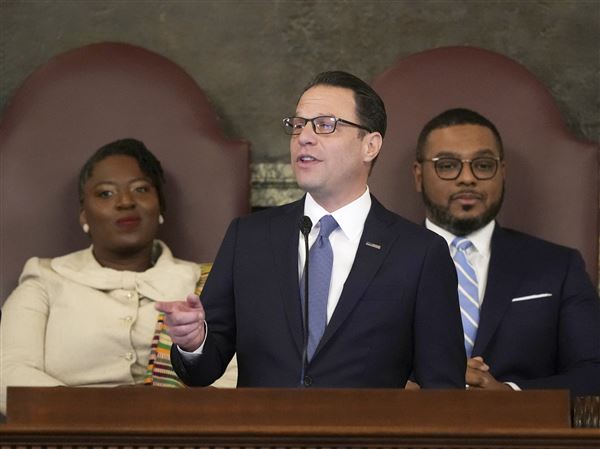Five years ago, Pittsburgh Public Schools educators earned top marks — and a $40 million grant from the Bill and Melinda Gates Foundation — for playing well with others. Teachers and administrators had agreed to use data in improving teacher performance, an agreement Mrs. Gates said was among those that “have the potential to serve as national models.”
But the debate about using teacher performance — rather than seniority — to determine which teachers are laid off for financial reasons can feel like an after-school rumble.
“We’ve been in the national spotlight because our teachers have said, ‘We want to grow and get better,’” said Pittsburgh Federation of Teachers president Nina Esposito-Visgitis. “So it’s disappointing that the focus is on getting rid of teachers.”
Among her disappointments: the increasingly activist role played by a local education watchdog group, A+ Schools. Carey Harris, its executive director, makes no apologies for taking a more strident position than A+ would have held a few years ago.
“I don’t think you build a culture of excellence when you have rules that ignore it,” she said.
For now “the dust has settled on some of this stuff,” said Nate Brown, the Gates Foundation senior program officer who has administered the grant. “But I expect it to come back up.”
Learning curve
Established in 2004, A+ may be best known for its annual “Report to the Community,” which provides a school-by-school breakdown of student performance and other data.
But in 2012, A+ decided it wanted not just to report on conditions, but to reshape them — especially when it came to the “achievement gap” between white students and those of color.
“We had this pent-up outrage about what was happening to black and brown kids,” said A+ Executive Director Carey Harris. “Our big question was ‘How can we increase our impact?’”
A+ proposed an answer in a strategic plan that year: “A+ Schools will shift” to become an organization “that clearly advocates for ... positions on school reform.”
Among those positions: urging that teacher layoffs incorporate performance evaluations rather than just weighing years of service. Currently, Pennsylvania law requires districts to make layoffs according to seniority.
Pittsburgh Public Schools already uses an evaluation system called the Research-based Inclusive System of Evaluation (RISE) to terminate teachers who aren’t making the grade. RISE uses standardized classroom tests, along with evaluations by students and administrators.
In evaluations released last June, nearly 97 percent of district teachers rated “proficient” or “distinguished.” But Ms. Esposito-Visgitis said using RISE for layoffs would be like grading essays on a curve: a subjective process that pits teachers against each other.
With classes and evaluators subject to change each year, she said, “Your ranking changes every time. Today you might be furloughed, but next year you might not.”
“If we’re unfortunate enough to have declining enrollment” requiring staff cuts, countered superintendent Linda Lane, she’d “prefer to keep our most distinguished teachers.”
A+ first staked out that position in 2012, when the district faced the layoff of 280 teachers, including 16 who were highly rated but had little seniority. Most of those were later rehired, but A+ continued the campaign by backing state House Bill 1722. That 2013 measure would use seniority solely as a “tie-breaker” between similarly rated teachers facing layoffs.
A+ co-hosted a September panel discussion with legislators supporting the bill, and an October appearance by Howard Fuller, a union foe who formerly headed the Milwaukee school system. Dissenting voices were absent at both events.
Measures like HB 1722 are popular in some corners. African-American advocacy groups like the Urban League have participated in A+ events, and when Mr. Fuller declared that schools “have to make it possible to get rid of people who should not be teaching,” there was a chorus of “Amen” from the crowd filling the Hill House’s Kaufmann Center auditorium.
Still, the A+ plan acknowledged “concern about jeopardizing A+ Schools’ objectivity.” And taking on seniority “was a risk,” said Jeanne Pearlman, a senior vice president for the Pittsburgh Foundation, whose funding helped establish A+. “That particular stance helped divide likely allies.”
The Gates factor
When Pamela Harbin began volunteering with A+ Schools six years ago, “I felt it represented anyone fighting for quality education.”
But in 2012, said the Point Breeze mother of two, “I didn’t understand why they were talking about teacher evaluation and not [issues like] class sizes increasing.”
One theory: A+ received $1 million from the Gates Foundation between 2011 and 2013.
“If [Gates] said, ‘Here’s a million dollars if you stand on your head’ — I can’t stand on my head, but for $1 million I would try,” said Highland Park resident Michelle Boyle, another disenchanted A+ volunteer.
The reason A+ focused on evaluations “is and isn’t because of Gates,” said Ms. Harris. “Why wouldn’t we, when the district and teachers were already working on it?”
Mr. Brown, of the Gates Foundation, agreed that once evaluations are created, “a lot of folks will have questions” if they aren’t used in personnel decisions. “Our perspective was, ‘You said you’d use this information to [ensure kids had] access to the best educators.’”
Gates, with its hands on the purse strings, pressured the union and district earlier this year when they disagreed over how stringently to apply RISE standards. Mr. Brown said Gates wasn’t demanding a specific outcome, but compelling both sides “to be collaborative.”
Mr. Brown added that Gates makes grants to “thought partners” like A+ Schools to ensure education remains in the public eye. Gates doesn’t dictate their message, he said: “As long as there’s dialogue, I consider it a victory.”
But school board member Mark Brentley Sr., an often lonely voice opposed to the Gates agenda, called A+ Schools “a political-action group funded by the foundation community. But you can’t go against them, because [the school district] receives their money too.”
“Gates is hiring organizations to speak on its behalf,” said Jessie Ramey, a parent whose blog Yinzercation has criticized the Gates agenda. The result, she said, is a focus on “side arguments, when we need to focus on how we’re going to make schools great places.”
Critics like Ms. Ramey agree teaching quality is important, but say it must be considered in a broader context of poverty. They favor a focus on education funding and creating “community schools,” which provide education and social services to the community.
“When you are talking about evaluating teachers,” Ms. Ramey added, “you’re really inflicting more testing on students,” which disrupts learning, and whose results are “highly dependent on poverty.”
State Rep. Jake Wheatley, a Hill District Democrat who supports HB 1722, acknowledged that poverty makes it “a struggle to get some kids into school. But I want to hold educators responsible for what happens when they get there.”
Math test
In Harrisburg, unions would seem to rule the halls.
A political action committee tied to the Pennsylvania State Education Association, which represents most teachers outside Pittsburgh and Philadelphia, has spent $4.2 million on political activity since 2012, state records show. Committees affiliated with the PFT and its statewide affiliate have spent just under $152,000: The AFT’s national organization gave $661,781 to Gov.-elect Tom Wolf this fall.
A+ Schools has reported spending just $52,254 lobbying Harrisburg this year. But it has at least two well-funded allies: the Pennsylvania Campaign for Achievement Now (PennCAN) and StudentsFirst.
StudentsFirst was founded by Michelle Rhee, the controversial former head of the Washington, D.C. schools. In Pennsylvania, said state director Ashley DeMauro, ending seniority-based layoffs is a top priority: Within a school, she said, “There is nothing more important than the effectiveness of teachers.”
PennCAN is part of a national network, 50CAN, that advocates for charter schools. But traditional schools would improve if “districts operated more like charters — with more principal autonomy over their personnel,” said PennCAN executive director Jonathan Cetel.
The groups share some well-heeled donors. For example, in 2012 StudentsFirst launched a political-action committee with $300,000 from Arthur Rock, a California venture capitalist and top 50CAN donor. StudentsFirst has given $204,000 in campaign contributions to state officials since then. Together, PennCAN and StudentsFirst have also spent nearly $435,000 on lobbying since 2012.
House Bill 1722 died in the last legislative session, but it was approved by the House Education Committee: Most legislation never gets even that far. “We’ll seek to get that reintroduced in January,” Ms. DeMauro said.
The measure’s prospects are uncertain. Republicans control the legislature, but Mr. Wolf seems wary. “We need to move the conversation away from how school districts should manage massive ... layoffs” and focus on investing more in schools, Wolf spokesman Jeffrey Sheridan said.
A+ Schools, PennCAN, and the teacher’s union agree on that much. All have joined the Campaign for Fair Education Funding, which seeks increased education spending. But the seniority dispute has eroded trust between teachers and A+ Schools, Ms. Esposito-Visgitis said.
“We fear what their agenda is now,” she said.
Chris Potter: cpotter@post-gazette.com or 412-263-2533
First Published: January 4, 2015, 5:00 a.m.


















